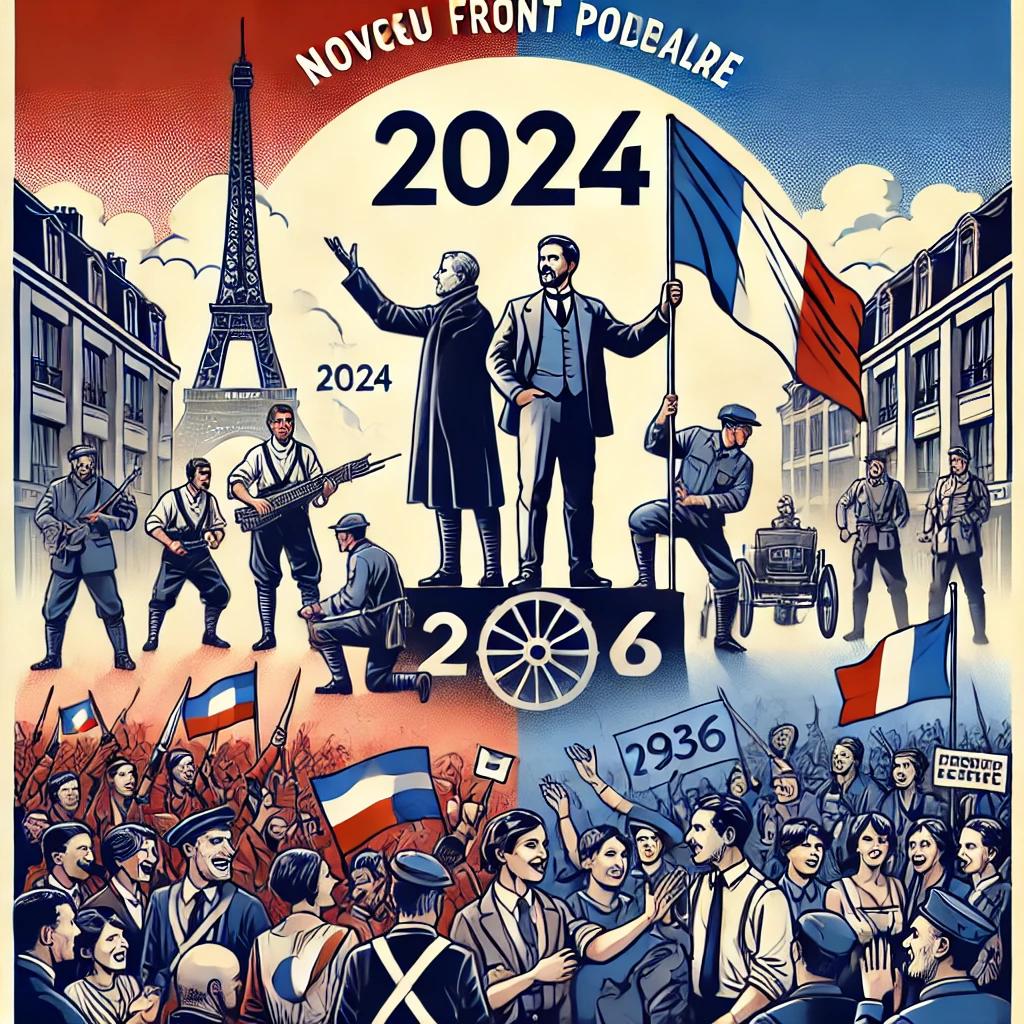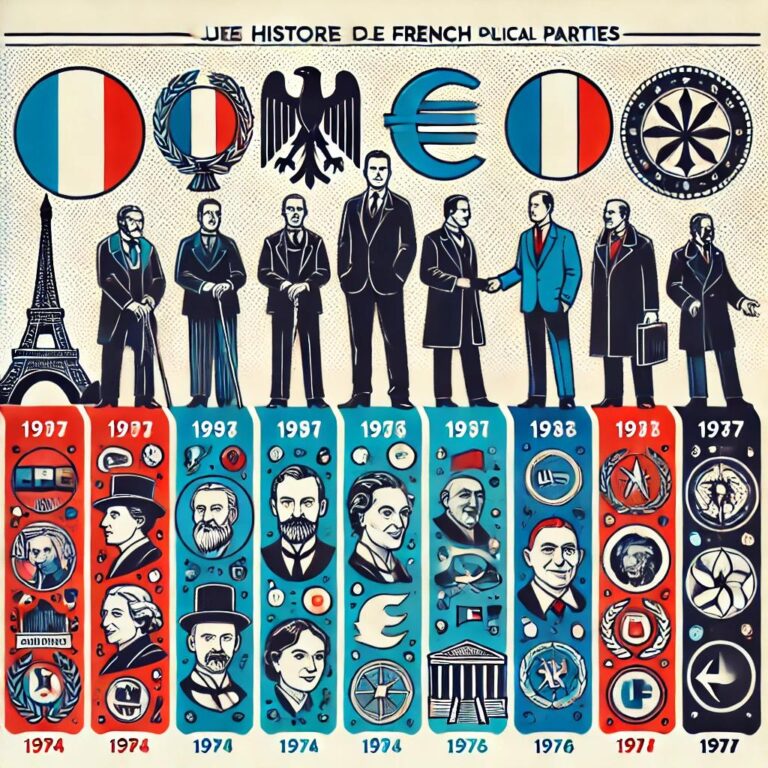
Introduction
The Nouveau Front Populaire of 2024 has emerged as a significant force in the contemporary political landscape of France. This coalition, comprising a diverse array of political parties and social movements, seeks to address the pressing socio-economic challenges facing the nation today. Its rise to prominence has drawn inevitable comparisons to the historic Front Populaire of 1936, a leftist alliance that profoundly influenced French politics during a period of intense social upheaval.
In 1936, the Front Populaire, led by the Socialist Party, the Communist Party, and the Radical and Socialist Party, came together to confront the economic hardships and social inequalities exacerbated by the Great Depression. Their victory in the legislative elections resulted in significant reforms, including the introduction of paid holidays, the establishment of a 40-hour workweek, and the nationalization of key industries. These measures aimed to improve the living conditions of the working class and reduce the growing social tensions of the time.
Fast forward to 2024, the Nouveau Front Populaire finds itself navigating a similarly turbulent political environment. Contemporary France is grappling with issues such as economic disparity, unemployment, and a growing disillusionment with traditional political institutions. The new coalition, like its predecessor, seeks to unite various left-leaning factions to create a unified front capable of enacting progressive reforms. By drawing on the historical legacy of the 1936 movement, the Nouveau Front Populaire aims to inspire a new generation of voters and activists, advocating for social justice, economic equality, and political transparency.
This blog post will delve deeper into the parallels and distinctions between the two movements, examining the socio-political contexts that gave rise to them, their key players, and the lasting impact they have had on French society. Through this exploration, we aim to provide a comprehensive understanding of how historical lessons can inform and shape contemporary political strategies.
Historical Context: The Front Populaire of 1936
The Front Populaire of 1936 emerged as a significant political coalition in France, consisting of various leftist parties, including the French Section of the Workers’ International (SFIO), the Radical-Socialist Party, and the French Communist Party. This alliance was formed against the backdrop of increasing political unrest and economic difficulties brought on by the Great Depression, which had severely impacted France. The coalition’s primary goal was to counter the rising threat of fascism and to address the socio-economic issues plaguing the country.
Under the leadership of Léon Blum, the Front Populaire won the legislative elections in May 1936, marking a historic victory for the coalition. This government was notable for implementing a series of ambitious social and economic reforms that aimed to improve the living and working conditions of the French populace. One of the most significant achievements of the Front Populaire was the introduction of the Matignon Agreements, which resulted in substantial labor reforms. These included the establishment of a 40-hour workweek, paid vacations, and collective bargaining rights for workers.
Moreover, the Front Populaire government nationalized key industries and took steps to modernize the French economy. These measures were designed to stabilize the economic situation and to provide a social safety net for the working class. The coalition’s efforts led to an increase in public spending on social welfare programs, education, and infrastructure, which had a lasting impact on French society. The policies of the Front Populaire fostered a sense of solidarity and optimism among the working-class citizens, who had long been marginalized and underrepresented in the political sphere.
The social and economic reforms implemented by the Front Populaire of 1936 not only improved the immediate conditions of the French people but also set a precedent for future governments. The coalition’s legacy is evident in the continued emphasis on workers’ rights and social justice that characterize French political discourse to this day. Thus, the historical significance of the Front Populaire lies not only in its immediate achievements but also in its enduring influence on the political and social landscape of France.
Formation of the Nouveau Front Populaire in 2024
The Nouveau Front Populaire of 2024 emerged as a significant political coalition in response to a myriad of socio-economic and political challenges facing France. This coalition, reminiscent of the historic Front Populaire of 1936, was formed by a diverse array of political parties and influential figures. Key participants included the Socialist Party (PS), the Green Party (EELV), and the left-wing populist La France Insoumise (LFI). These groups were united by a common goal: to address growing economic disparity, social unrest, and the rise of far-right ideologies.
Several prominent political figures played pivotal roles in the coalition’s formation. Jean-Luc Mélenchon of La France Insoumise, Olivier Faure of the Socialist Party, and Yannick Jadot of the Green Party were among the leaders who spearheaded the initiative. Their collective vision was to create a unified front capable of countering the increasing influence of far-right parties and addressing the pressing needs of the French populace.
The socio-economic conditions that spurred the formation of the Nouveau Front Populaire in 2024 bore striking similarities to those of the 1930s. France, grappling with high unemployment rates, income inequality, and a stagnant economy, witnessed widespread discontent among its citizens. Additionally, the global pandemic exacerbated existing issues, leading to increased social tension and calls for substantial reform. The political landscape was further complicated by the resurgence of nationalist and far-right movements, which threatened the nation’s democratic values.
Drawing parallels with the 1930s, the Nouveau Front Populaire aimed to implement progressive policies to alleviate economic hardship and restore social cohesion. The coalition sought to introduce measures such as wealth redistribution, increased social services, and environmental sustainability initiatives. By addressing these critical issues, the Nouveau Front Populaire endeavored to create a more equitable and just society, reflecting the core ideals of its historical predecessor.
Core Values and Objectives
The Nouveau Front Populaire of 2024 is a coalition that rallies around a set of core values and objectives designed to address contemporary societal challenges while drawing inspiration from the historical Front Populaire of 1936. Central to their ethos is a robust commitment to social justice, advocating for policies that aim to reduce inequality and ensure fairness across all social strata. This modern coalition places a significant focus on economic equality, proposing measures to close the wealth gap and provide equitable opportunities for all citizens. This aligns with the 1936 movement’s emphasis on reducing social disparities, although the modern iteration incorporates more nuanced approaches to address the complexities of today’s economy.
Labor rights remain a pivotal concern for the Nouveau Front Populaire, echoing the 1936 Front Populaire’s strong support for workers. However, the current movement expands on this foundation by incorporating contemporary labor issues such as the gig economy, remote work, and the rights of freelance workers. Their objectives include ensuring fair wages, safe working conditions, and comprehensive benefits for all types of employment, reflecting an evolved understanding of labor rights in the 21st century.
Environmental sustainability is another cornerstone of the Nouveau Front Populaire’s platform. Unlike the 1936 movement, which primarily focused on industrial labor and social reforms, the 2024 coalition places a significant emphasis on combating climate change and promoting green policies. This includes advocating for renewable energy sources, sustainable agricultural practices, and stringent environmental regulations to protect natural resources for future generations.
While the core values of social justice, economic equality, and labor rights show clear continuity from 1936, the Nouveau Front Populaire’s inclusion of environmental sustainability marks a distinct evolution. This broader scope reflects the contemporary movement’s responsiveness to the urgent global challenges of the modern era, aiming to create a just, equitable, and sustainable society.
Political Strategies and Campaign Tactics
The Nouveau Front Populaire of 2024 has adopted a multifaceted approach to political strategies and campaign tactics, drawing significant inspiration from the historical Front Populaire of 1936. Much like its predecessor, the modern coalition has focused on uniting diverse political factions under a common banner. This coalition-building has been pivotal in consolidating support from various social and economic groups, ranging from labor unions to progressive intellectuals.
In an era where digital media reigns supreme, the Nouveau Front Populaire has effectively harnessed social media platforms to disseminate their message and engage with the electorate. This digital strategy contrasts sharply with the traditional print and radio campaigns employed in 1936, though the underlying goal remains consistent: to foster widespread public support through accessible and relatable communication channels. The use of data analytics to tailor campaign messages to specific demographics has further enhanced their outreach, ensuring that their policies resonate with a broad audience.
Addressing contemporary issues has been at the forefront of their campaign. The Nouveau Front Populaire has prioritized policies on climate change, social justice, and economic inequality, reflecting the urgent concerns of today’s electorate. This focus on current affairs mirrors the 1936 coalition’s emphasis on workers’ rights and social reforms, showcasing a timeless commitment to addressing the pressing needs of society. By championing these causes, the coalition has positioned itself as a progressive force capable of enacting meaningful change.
Moreover, the Nouveau Front Populaire has employed grassroots mobilization techniques reminiscent of the 1936 movement. Town hall meetings, community organizing, and public demonstrations have been crucial in building momentum and fostering a sense of collective purpose. These tactics not only galvanize support but also create a robust network of advocates who can amplify the coalition’s message at the local level.
Overall, the political strategies and campaign tactics of the Nouveau Front Populaire reflect a blend of historical inspiration and modern innovation. By leveraging the strengths of both eras, the coalition aims to create a cohesive and dynamic force capable of navigating the complexities of France’s contemporary political landscape.
Public and Media Reactions
The emergence of the Nouveau Front Populaire (NFP) in 2024 has stirred a wide array of reactions within both the public and media spheres. Public opinion is notably polarized, reflecting a complex tapestry of support and opposition that echoes the diverse responses to the original Front Populaire of 1936. Supporters of the NFP laud the movement for its renewed focus on social justice, economic reform, and its commitment to addressing contemporary issues such as climate change and inequality. This segment of society, including younger generations and progressive factions, views the NFP as a necessary response to perceived failures of traditional political entities.
Conversely, opposition to the NFP is equally vocal. Critics argue that the movement’s policies are overly ambitious and financially unsustainable, drawing parallels to the economic difficulties that plagued the 1936 Front Populaire. This skepticism is particularly prevalent among conservative groups, business leaders, and older citizens who favor more gradual reform and economic stability. Concerns about potential disruptions to the market and fears of increased taxation contribute to their apprehension.
Media reactions mirror these public sentiments, with coverage reflecting the ideological leanings of respective outlets. Progressive media sources often highlight the NFP’s potential to bring about meaningful change and social equity, celebrating its grassroots origins and its alignment with global progressive movements. In contrast, conservative media outlets are more critical, emphasizing the risks and potential fallout of the NFP’s proposed policies, often drawing historical comparisons to the economic struggles faced during the era of the original Front Populaire.
The comparison to the 1936 Front Populaire is a recurring theme in both public and media discourses. Just as the 1936 movement was met with both fervent support and staunch opposition, the NFP’s rise in 2024 is similarly divisive. This historical parallel underscores the enduring relevance of the issues at hand and highlights the cyclical nature of political movements and public response. As the NFP continues to gain traction, its ability to navigate these varied reactions will be crucial in shaping its future trajectory.
Potential Risks and Challenges for France
The Nouveau Front Populaire of 2024 brings with it a series of potential risks and challenges that could significantly impact France’s political, economic, and social landscape. One of the primary concerns is economic stability. The proposed policies aimed at social equity and labor rights, while well-intended, may strain the national budget and lead to increased public spending. This could potentially exacerbate France’s existing fiscal deficits and result in higher taxes or cuts to other essential services.
Political polarization is another significant risk. The Nouveau Front Populaire’s platform, which seeks to unite various left-leaning factions, might deepen the ideological divide within the country. This polarization could hinder effective governance and lead to legislative gridlock, as opposing parties struggle to find common ground. The heightened political tensions could also manifest in increased activism and protests, reminiscent of the social unrest seen during the Front Populaire era of the 1930s.
Social unrest is a considerable challenge that France might face under the Nouveau Front Populaire. The historical Front Populaire movement in the 1930s saw widespread strikes and demonstrations, driven by workers demanding better conditions and rights. Similarly, the 2024 movement’s emphasis on labor rights and social justice could lead to large-scale mobilizations and potential conflicts with business interests and conservative segments of society. These social movements, while a testament to democratic engagement, could disrupt daily life and pose challenges to maintaining public order.
Comparing these potential risks to those faced during the 1930s, it’s evident that while the contexts differ, the underlying issues of economic management, political cohesion, and social harmony remain pertinent. The historical Front Populaire had to navigate the Great Depression’s economic fallout and rising political extremism, challenges that echo in today’s uncertain global economic environment and increasing ideological divides.
In navigating these challenges, the Nouveau Front Populaire must balance its progressive ambitions with pragmatic economic and political strategies to ensure stability and unity within France.
Conclusion
The examination of the Nouveau Front Populaire of 2024 reveals intriguing parallels and significant differences when compared to the Front Populaire of 1936. Both movements emerged during periods of socio-political unrest, advocating for extensive reforms to address economic inequalities and social justice. The Front Populaire of 1936, led by Léon Blum, was instrumental in implementing labor reforms, including the 40-hour workweek and paid vacations, which left an indelible mark on French society. Similarly, the Nouveau Front Populaire is poised to address contemporary challenges such as economic disparity, climate change, and social inclusion.
However, the political landscape of 2024 is markedly different from that of 1936. The rise of digital media, globalization, and the European Union’s influence have reshaped the dynamics of political mobilization and policy-making. While the 1936 movement primarily relied on traditional forms of political engagement and mass mobilizations, the Nouveau Front Populaire leverages digital platforms to galvanize support and disseminate its message. This modern approach allows for a broader and more diverse coalition, reflecting the multifaceted nature of contemporary French society.
The future trajectory of the Nouveau Front Populaire will likely hinge on its ability to maintain a cohesive front while addressing the diverse demands of its constituent groups. Its potential impact on French politics and society could be profound, particularly if it succeeds in implementing policies that resonate with the electorate’s desire for economic equity and social justice. The movement’s emphasis on environmental sustainability and digital innovation may also position France as a leader in addressing global challenges.
In conclusion, while the Nouveau Front Populaire of 2024 echoes the spirit of the 1936 movement, it also represents a forward-looking vision adapted to the complexities of the 21st century. Its success will depend on its ability to navigate the intricate political landscape and deliver tangible benefits to the French populace.




